Office Closure Notice

Office Closure Notice

Date: 17 October 2025
Please be advised that the Office of the Ombudsman is closed today due to unforeseen road works outside the premises and a temporary water supply interruption.
For urgent matters, please contact:
We can also be reached via our usual email contacts for any assistance.
Normal business operations will resume on Monday, 20 October 2025.
We apologise for any inconvenience caused and thank you for your understanding.
Office of the Ombudsman
The Australasia & Pacific Regional Conference is comprised of Taiwan and Hong Kong from Asia and New Zealand, Australia, Solomon Islands, Papua New Guinea, Vanuatu, Tonga, Samoa, Cook Islands from the Pacific and is likely to see more growth in membership.
The Australasia & Pacific Region (APOR) is one of the six regional chapters of the International Ombudsman Institute (IOI). It holds conferences every year, and this year Taiwan’s Control Yuan hosted its 31st Conference over a 3 day period.
The first day of Conference saw members providing brief reports from each jurisdiction and was represented by Taiwan, Hong Kong, Australia, Papua New Guinea, Solomon Islands, and Cook Islands.

This session was moderated by Hsiao-hung Nancy Chen, Control Yuan, Republic of China (Taiwan), Member.

Panel speakers were Carmen Comas-Mata Mira, Secretary-General, Ibero-American Federation of Ombudsman (FIO), Head of International Affairs in the Office of the Spanish Ombudsman

Werner Amon, who was recently appointed the Secretary-General, International Ombudsman Institute (IOI) and incumbent Austrian Ombudsman

Second Vice President, International Ombudsman Institute (IOI), and incumbent Western Australia Ombudsman.
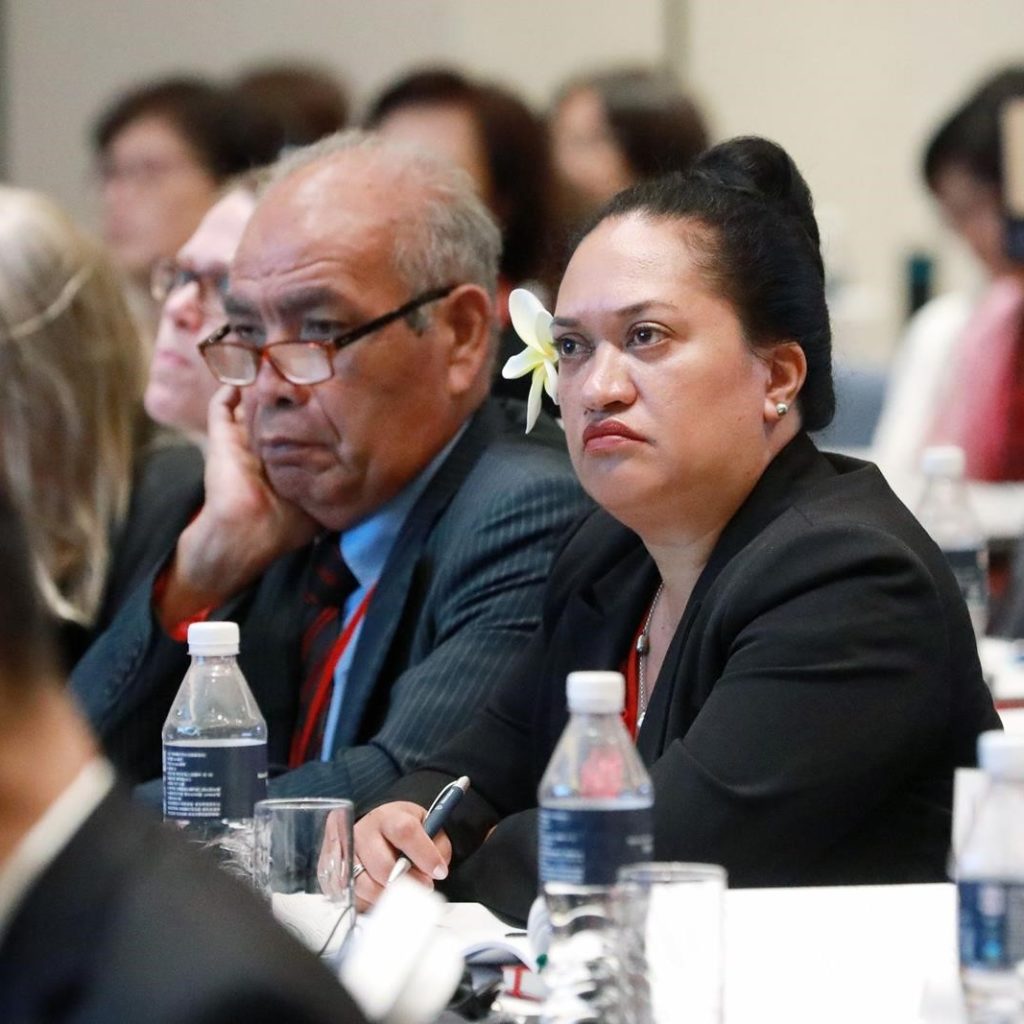
This session was moderated by Michael Dick, Chief Ombudsman from the Ombudsman Commission of Papua New Guinea.

Panel Speakers in this session were: Deborah Glass who is the Victorian Ombudsman, but also a Director of APOR

Mei-yu Wang, Member of Control Yuan, Republic of China (Taiwan)

Michael Manthorpe, Commonwealth Ombudsman, Australia
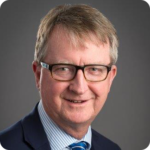
This session was moderated by Phil Clarke, Queensland Ombudsman, Australia

Panel Speakers in this session were:
Peter Boshier, President of APOR, Ombudsman of New Zealand

Tzong-ho Bau Convener, International Affairs Committee, Control Yuan Member, Control Yuan, Republic of China (Taiwan)

Iitsuka Masao, Director, Administrative Counselling Office, Administrative Evaluation Bureau, MIC, Japan

Elizabeth Rynning, Chief Parliamentary Ombudsman, Sweden

Our gracious hosts also offered a tour of Taipei City through the National Palace Museum and the Lin Family Mansion and Gardens.


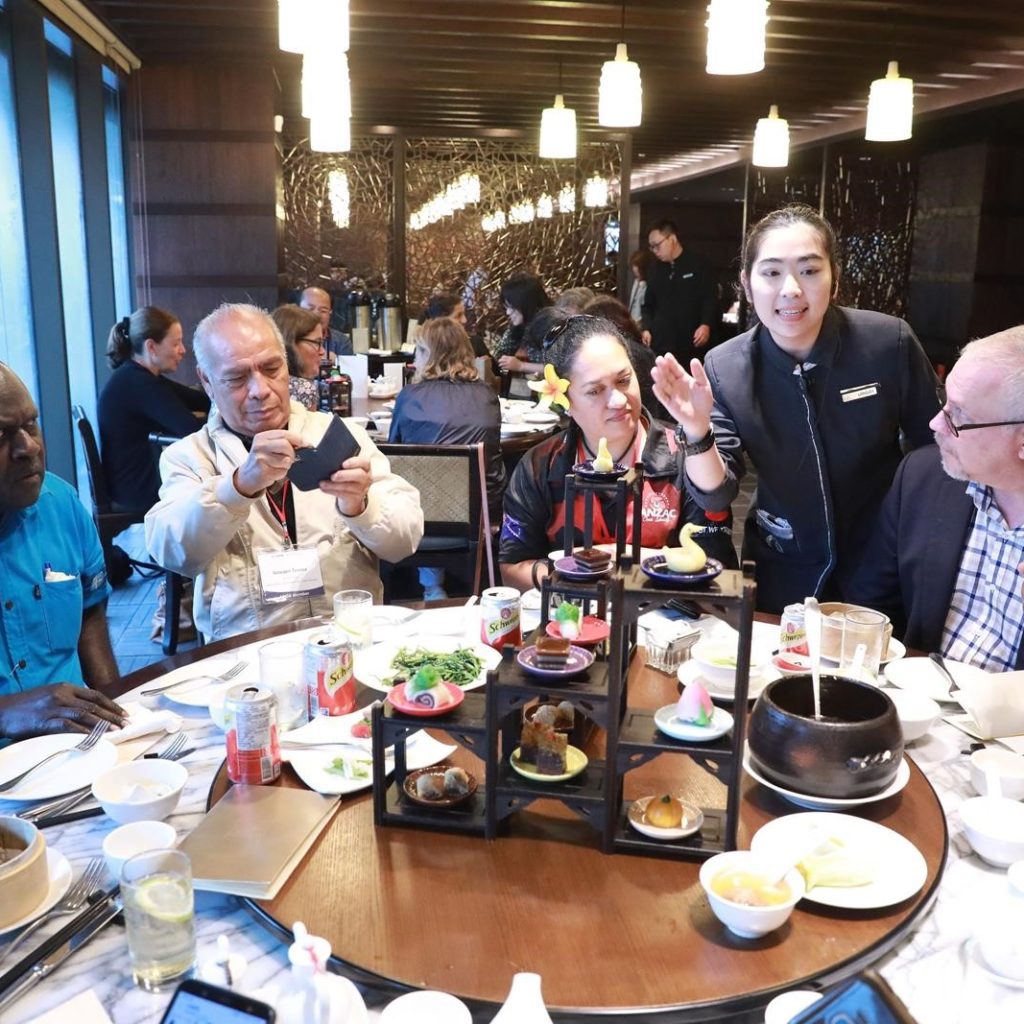
Figure 5 Waitress describes the dishes on the towers to a table of APOR conference members
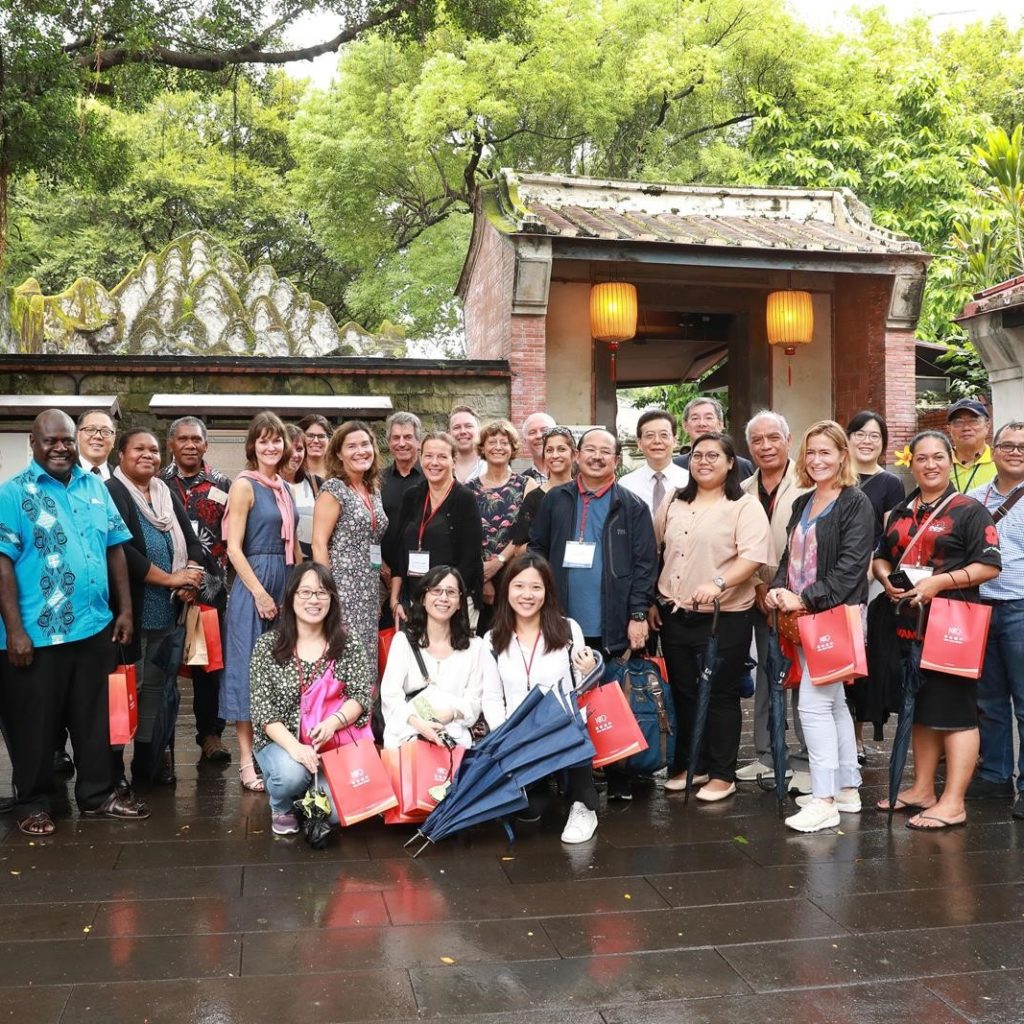
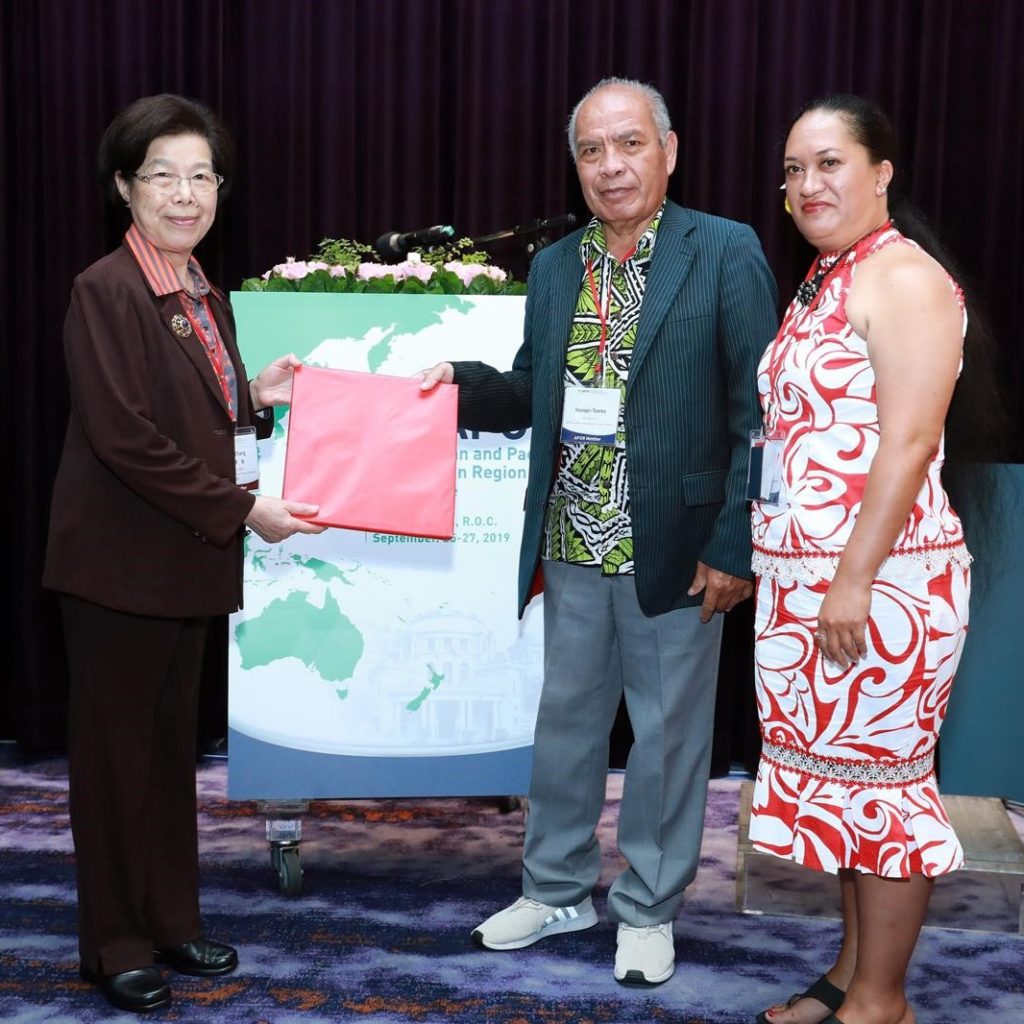
The Office of the United Nations High Commissioner for Human Rights – Regional Office for the Pacific (OHCHR-ROP) hosted a three day Regional Human Rights and Climate Change Conference focusing on climate justice, national human rights institutions, and migration in the context of climate change in the Pacific from 5-7 August 2019, in Nadi, Fiji
The conference amongst other things considered the negative impacts caused by climate change in the region. The Conference brought together around 50 participants including Government Officials from Pacific Island countries, representatives of civil society regional organisations, international and regional organisations and national human rights institution officials to share their knowledge and help Pacific countries explore ways to raise the visibility of climate change justice, business and human rights, migration, adaptation and resilience including specific sessions to address individual thematic human rights issues.
The three day conference included the following thematic sessions:
• Climate change in the Pacific – Resilience, adaptation and mitigation
• Introduction to Human Rights – The international Bill of Human Rights, and the International Human Rights Mechanisms
• How National Human Rights Institutions (NHRIs) can champion climate change
• NHRIs and Climate Justice – What roles can they play and how can we build effective partnerships
• Introduction to UN Guiding Principles and linkages with SDGs
• Business responsibility for Climate Change
• Climate induced migration – identifying the issues, developments and key themes
• Ensuring the dignity, safety, and human rights of migrants are protected in the context of climate change
• Ensuring access to justice for those affected by climate change
Of particular interest to Senior Investigation Officer Nootai was these session facilitated by Roberto Cadiz, Human Rights Commissioner of the Philippines. The office is conscious that climate change migration is an inevitability and will take this into account in its strategic direction.
On 31 July 2019 and 1 August 2019 our two senior investigators, Liz Nootai and Joyce Ingram, attended Investigator Training hosted by the New Zealand Chief Ombudsman, Peter Boshier. The training was held at the Tanoa International Hotel in Nadi, Fiji.
The main facilitators of the training were from the Office of the Commonwealth Ombudsman – Director of Operations (North), Shirley Tong, Victorian Ombudsman Office – Strategic Advisor, Amanda Wilczynski, Energy and Water Ombudsman of Western Australia – Director of Energy and Water, Marcus Claridge and NZ Office of the Ombudsman – Principal Advisor, Tracey Harlen. We also had presenters from United Nations Human Rights, United Nations Development Programme and Anti-Corruption.
The two-day training took the investigators through a live case from the assessment through to the final opinion. The techniques and advice given by the experts have already proven to be useful within our local office they have been used to on current cases.
Takeaway from this workshop
• The network of friends and Ombudsman family that our office now has within the Pacific.
• That the message to an agency is of collaboration and not to lay blame.
• Sharing experiences with other investigators – for e.g our investigative experiences in the Cook Islands are so much different to those in Papua New Guinea.
Thank you Chief Ombudsman, Peter Boshier for allowing our office to be part of this training initiative.
With the assistance of the Chief Ombudsman of New Zealand Judge Peter Boshier, Ombudsman Tearea was able to undergo an early week-long training in the Ombudsman’s Office in Wellington.
There were many areas or topics covered during the week-long training. He was allocated to various teachers for each topic covered. Some of the topics covered may be summarised as follows;
1. Overview of the organisational structure, organisational values and the Ombudsman’s role
2. People & Capability – Overview of the personnel management. We call it here Human Resource Management.
3. Information and technology
4. International relations and the Ombudsman organisation such as APOR and IOI .Analysis ofNew Zealand and Cook Islands Ombudsman Acts in terms of jurisdiction by Tracey Harlen. This included an overview of the New Ombudsman Bill of the Cook Islands.
5. Ombudsman Act complaint handling and best practices.
6. Jurisdiction and comparative analysis of New Zealand and Cook Islands Official Information Act
7. Overview of OPCAT – inspection of prisons and Police holding cell. Selected reports were also provided
8. Meeting and discussion with IPCA Chair Judge Colin Doherty on investigating complaints about the Police and the Cook Islands Police Act 2012.
9. Teleconference session on Disability Rights with Auckland based team. This was an overview on how disability rights work in New Zealand including training ideas, solutions and support.
Undoubtedly the expansive nature of the New Zealand Ombudsman Office with clear demarcation of different roles is very impressive. Understandably that was no comparison for our small Office here in Rarotonga. He enjoyed viewing the technology employed in the Office including Waka, Awa and their new website which at the time was still being tested. I was also impressed with the calibre of each and every staff employed in their various divisions in the Office. In addition, he was surprised by their budgetary process in that it goes direct to Parliamentary Select Committee for consideration as opposed to going through Budget Committee, Cabinet and then to Parliament in the Cook Islands.
Monday April 01, 2019 Written by Losirene Lacanivalu Published in Local
Nooapii Tearea was appointed as the new ombudsman for a term of three years and was sworn in at a special ceremony held at the Cook Islands Parliament last week.
Deputy clerk of Parliament Helen Maunga welcomed the many guests who were present including the minister for Internal Affairs Mac Mokoroa, students of Nukutere College and families and friends of Tearea as well as staff members of the Ombudsman’s Office.
Clerk of Parliament, Tangata Vainerere said Tairea was appointed by warrant under the hand of the Queen’s Representative Sir Tom Marsters, acting on the recommendation of the executive council, on the advice of cabinet in accordance with section seven of the Ombudsman Act 1984.
In congratulating Tearea, Vainerere said this was a proud moment for Parliament, the government and the people of the Cook Islands.
“It is my humble prayer that God almighty will grant you a fruitful tenure for a successful and productive term as ombudsman,” he said.
Tearea’s term is effective from February 26, 2019 and he takes on the role previously held by Tearoa John Tini.
Monday December 24, 2018 Published in Local
The revised Building Code for the Cook Islands and the newly-developed Strategic Roadmap for Emergency Management (SREM) were both launched on Tuesday last week by the Minister for Internal Affairs Sports, Police and Office of the Ombudsman, Vaine Mokoroa.
These two Cook Islands projects were made possible under the €19.57 million (NZ$33.06m) ACP-EU Building Safety and Resilience in the Pacific project (BSRP) being implemented by the Pacific Community (SPC) and Emergency Management Cook Islands.
Infrastructure Cook Islands building controller Louis Teiti said the potential for an increase in the intensity of cyclones in the Cook Islands prompted the need to review the building code and ensure that building infrastructure is up to standard.
Beca International Consultants Ltd was contracted to undertake a comprehensive review of the code and develop a manual to improve the safety and resilience of buildings in the Cook Islands.
Emergency Management Cook Islands director Charles Carlson said reviewing the Building Code is a positive move in the right direction, and one of the crucial components will be its implementation.
He observed the very high damage to housing in the Cook Islands during cyclones has been due to poor and sub-standard housing. The Building Code, he added, would ensure reduced structural damage in times of disasters.
Carlson said an increase in the severity and regularity of natural disasters in the Cook Islands in recent years had prompted various disaster alleviation methods and strategies to reduce the risk of loss of life and property in a severe ‘event’.
The second achievement, the Strategic Roadmap, provides a map for stakeholders involved in national response to emergencies and disasters to reform the Cook Islands emergency management arrangements.
Carlson said the roadmap was timely and resulted in the maximising of limited resources to get maximum outcome. He said it would act as a guide and support the Cook Islands Joint National Action Plan (JNAP) for Disaster Risk Management and Climate Change Adaptation.
Carlson noted the consolidation of climate change and disaster risk management in the Cook Islands was a step in the right direction.
“By having both under one division, we work regularly together and we know what is going on in climate change and they know what is happening in disaster. There is no duplication of services. We complement what they are doing.
“With this SREM, we are also hoping to address gap areas within the Cook Islands Emergency Management Sector; the coordination of local emergencies that do not require declaration and the need for establishment of a National Fire Service.
“We will be more focused and coordinated in our response in times of disaster.”
The roadmap takes into account the diverse needs of the country’s remote island communities and aims to provide clear understanding of the different roles and responsibilities among stakeholders.
“We very much appreciate the assistance from the European Union and the Pacific Community for the funding support for the SREM and the Building Code,” he said.
The team leader for Natural Resources and Governance at the Delegation of the European Union for the Pacific, Ingrid Swinnen said: “The EU is proud to be involved in this initiative to identify, adopt and implement the best practice for disaster risk management to strengthen disaster resilience in the Cooks Islands, allowing for a more focused response.”
The Pacific Community’s Director of Geoscience, Energy and Maritime (GEM), Andrew Jones commended both work streams and the extension consultations undertaken, saying the Cook Islands will not only be more prepared, but would have better co-ordination of resources and personnel in response to disasters.
He said the need for increased communication was identified as a priority after detailed consultation following natural disasters in recent years.